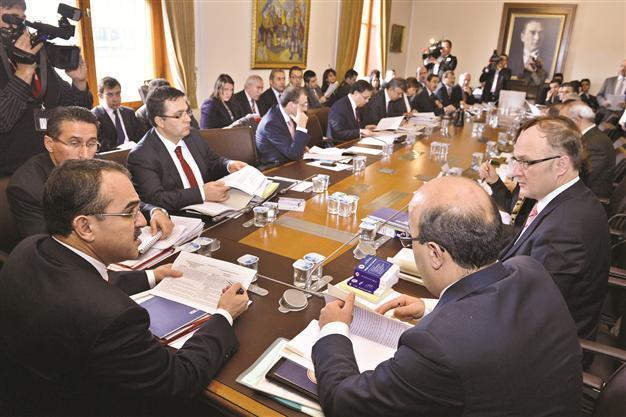Panel approves bill for prevention of terrorism financing
ANKARA

‘Since we signed international conventions, we have to meet our obligations for them,’ Ergin (L) tells the panel. AA Photo
Parliament’s Justice Commission has approved a long-delayed draft law on the prevention of the financing of terrorism in a move to “fulfill its obligations arising from international law.” The bill is expected to be passed in Parliament’s General Assembly soon.
Turkey will be demoted to the “black list” of the Financial Action Task Force (FATF) if it fails to adopt legislation on the prevention of the financing of terrorism by Feb. 22, Justice Minister Sadullah Ergin said during a debate on the long-delayed draft law at the commission.
“There are two countries on the black list of the FATF: Iran and North Korea. If Turkey fails to adopt the legislation by Feb. 22, the Turkish economy may face serious problems. In such a case money transfers from and to Turkey would be possible only after checks by the FATF’s examination mechanism. This mechanism would cause serious problems for Turkey’s exports, imports and hot money flow, which could lead to negative impacts on general parameters of our economy,” Ergin said.
Turkey has long been under international pressure to adopt the bill, but progress has been slow. The draft bill on the prevention of financing of terrorism has long been on the agenda of the commission as the government submitted it to Parliament on Oct. 21, 2011. In March 2012 the draft was sent to a sub-commission, where it underwent changes. The Justice Commission last discussed the draft on May 2, 2012.
Responding to opposition deputies’ criticism that primarily the U.S. pushed Turkey to adopt the bill, Ergin said: “The U.S. is not pressuring Turkey to adopt the law; it’s the FATF. Since we signed international conventions, we have to meet our obligations for them,” Ergin said.
An official from the Foreign Ministry, also speaking during commission debates, said the international pressure on Turkey was mainly a result of endeavors to prevent al-Qaeda and the Taliban from being financed, adding that the Sanctions Committee of the United Nations Security Council, which was established to prevent the financing of terrorism, imposed sanctions on individuals, groups and entities considered to be associated with al-Qaeda and the Taliban.
FATF is an intergovernmental organization founded to develop policies to combat money laundering and terrorism financing. It has 34 member countries including the U.S., the U.K., China, Russia and Japan and two international bodies including the EU.
Opposition parties have long argued that the bill would only serve the interests of foreign countries and would not help Turkey in freezing the financial assets of the outlawed Kurdistan Workers’ Party (PKK) abroad.
Ruling Justice and Development Party (AKP) lawmaker Hakkı Köylü said his party was not lending its support for this bill “voluntarily.” “This is not a bill that we adopt willingly and voluntarily. Many subjects in this draft bill already exist in our legislation. But we were asked for stricter regulations,” Köylü said.
Adem Sözüer, a law professor and adviser to the Justice Commission, said some articles of the bill breach the Turkish Constitution as well as the European Convention of Human Rights. “Those powers that kept people in Guantanamo without trial for years demand Turkey adopt this bill,” Sözüer said.
“For example, [influential Islamic scholar] Fethullah Gülen is considered to be related with Islamic terrorism in some countries. … Or some nongovernmental organizations may be considered terrorist organizations just because they have Islamic roots. For instance, the NGO that financed the Mavi Marmara can be considered a terrorist organization. This regulation is against Turkey’s interests.”
